
Management Meeting: How to Structure & Conduct for Maximum Productivity?
As the famous management guru Peter Drucker put it, ‘The most important thing in communication is hearing what isn’t said‘. That’s exactly what management meetings are all about – recognizing the important but often overlooked elements for organizational progress.
Previously we discussed different types of meetings, but today we’re diving into one that can truly transform your organization: the management meeting.
This meeting isn’t just routine—it’s a powerful tool to boost productivity and alignment. That’s why we’ve crafted this guide with practical tips to help you run smoother, more effective management meetings.
Keep reading to learn more!
What is a Management Meeting?
A management meeting is a planned session where key leaders from different parts of an organization come together to discuss important topics, set priorities, and make decisions.
It’s a great opportunity to understand what each department is working on and encourage teamwork across different areas.
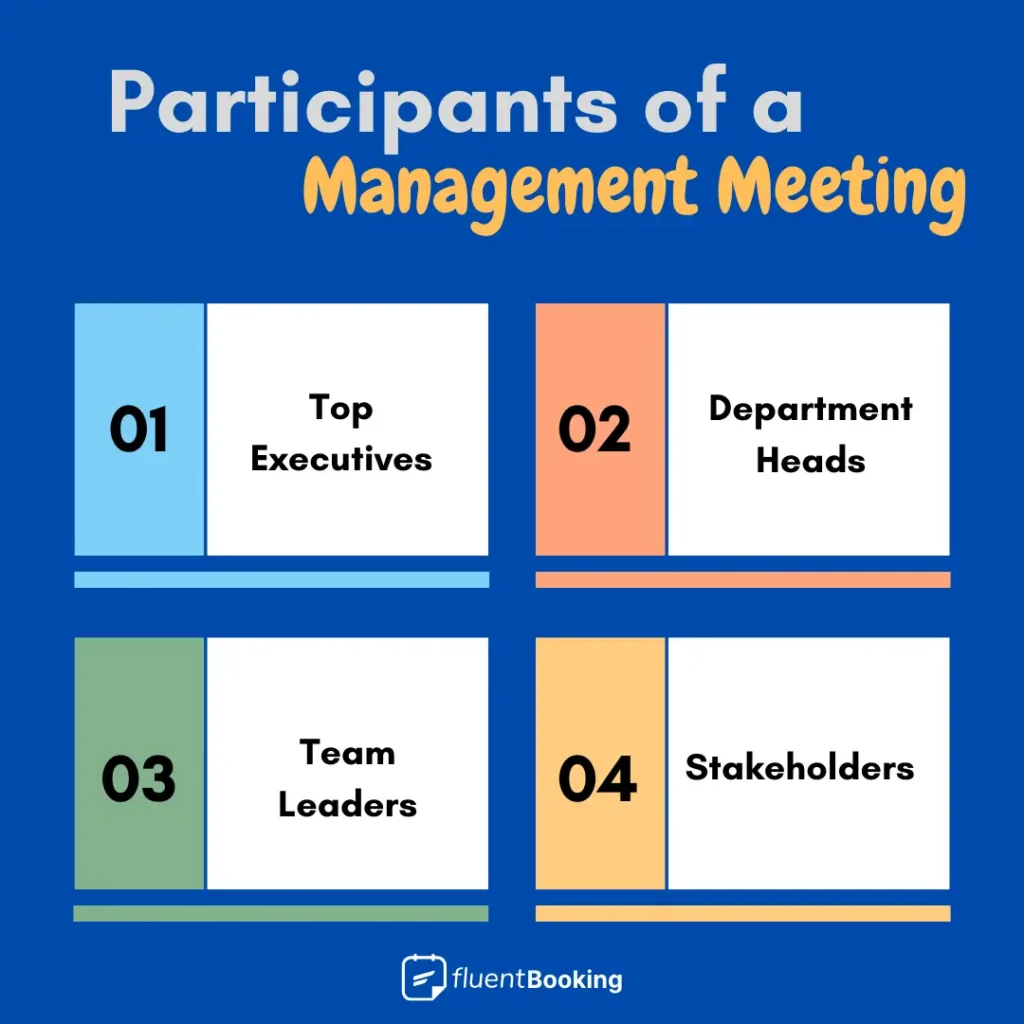
To ensure a meeting is effective, it’s important to have the right participants involved. Here’s who should attend a management meeting:
- Top Executives: High-level leaders like the CEO or President are key players. They provide overall direction and make strategic decisions, so their presence is vital.
- Department Heads: Leaders managing different departments bring valuable insights. They ensure their areas are aligned with broader goals and address any operational issues.
- Team Leaders: Leaders of specific teams or projects should attend to share updates on their team’s progress and challenges, which helps everyone make informed decisions.
- Stakeholders: Depending on the topics, sometimes relevant stakeholders can be included in management meetings to bring diverse viewpoints, ensuring well-rounded decisions.
Additional information: The frequency of management meetings depends on the organization’s needs: Management meetings can occur weekly for regular updates, bi-weekly or monthly for moderate planning, and quarterly for in-depth strategic reviews.
FluentBooking – The Ultimate WordPress Scheduling Solution
What are the Benefits of a Management Meeting?
How can management meetings bring positive outcomes to your organization? Let’s break down the main benefits:
- Strategic Planning: Allocating resources and planning budgets for efficiency
- Performance Review: Evaluating project progress and setting priorities
- Customer Insights: Improving customer service by discussing their feedback
- Problem-Solving: Addressing issues and finding solutions together
- Goal Setting: Defining business objectives and strategies
- Team Collaboration: Encouraging cooperation and synergy across departments
- Professional Growth: Sharing knowledge to support team members’ development
- Recognition: Celebrating achievements and boosting team morale
Management Meeting Types & Agenda
Management meetings come in various forms, each serving a unique purpose. Here’s a quick look at some of the key types of management meetings:
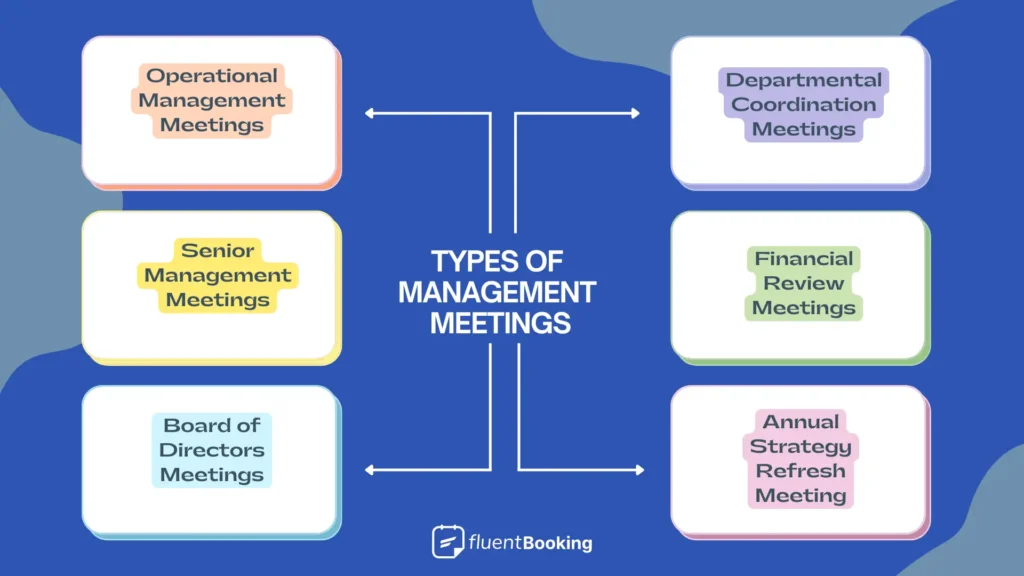
Operational Management Meetings
- Purpose: To ensure alignment on project goals, address any emerging issues, and track progress toward milestones
- Focus: Coordinating tasks, managing resources, and resolving project-specific challenges
- Key Elements: Project updates, task delegation, progress tracking, and problem-solving
Senior Management Meetings
- Purpose: To align team efforts with long-term company strategies and ensure that all departments are working towards common objectives
- Focus: Setting strategic priorities, reviewing performance metrics, and adjusting plans based on market conditions
- Key Elements: Strategy reviews, goal setting, performance analysis
Board of Directors Meetings
- Purpose: To provide a forum for senior leaders to discuss high-level issues, drive organizational change, and set overall direction
- Focus: High-level decision-making, resource allocation, and setting the tone for organizational culture and priorities
- Key Elements: Leadership discussions, decision-making, executive updates, and strategic planning
Departmental Coordination Meetings
- Purpose: To help different departments work together smoothly, solve cross-functional problems, and keep operations running efficiently
- Focus: Enhancing inter-departmental cooperation, sharing updates, and tackling shared challenges
- Key Elements: Inter-departmental updates, coordination of activities, and resolution of cross-functional issues
Financial Review Meetings
- Purpose: To analyze financial performance, review budget allocations, and plan future financial strategies
- Focus: Financial performance, budget management, and financial forecasting
- Key Elements: Budget reviews, financial reports, expense tracking, and future financial planning
Annual Strategy Refresh Meeting
- Purpose: To review performance from the past year and update the company’s strategy to stay aligned with future goals
- Focus: Evaluating and refining the strategy map, measures, targets, and initiatives for the upcoming year
- Key Elements: Update strategy map, adjust measures and targets, plan initiatives, and assign accountability
If meetings were a dish, the agenda would be the secret sauce. Without it, you’re just tossing ingredients in a pot and hoping for a miracle!
To ensure a productive meeting, we have prepared the following agenda to guide your management meeting:
| Agenda Item | Outcome | Duration |
| Welcome and Opening Remarks | Greet attendees and outline meeting objectives | 5 min |
| Review Previous Meeting | Recap tasks from the last meeting and status update on progress | 5 min |
| Project Updates | Team leaders provide project updates, milestones, and challenges | 10 min |
| Key Discussions | Focus on primary topics like KPIs, strategic plans, and resource allocation | 15 min |
| Problem-Solving | Address new challenges and planning solutions | 5 min |
| New Issues | Discuss new issues or upcoming changes | 5 min |
| Assign Action Items | Delegate tasks with clear responsibilities and deadlines | 5 min |
| Closing Remarks | Summarize key points and confirm the next meeting | 5 min |
Insider Tip: Try to sprinkle in some fun. A quirky agenda item can break the ice. Give this a go: “Share your most embarrassing office moment”. Laughter makes people more open!
FluentBooking – The Ultimate WordPress Scheduling Solution
What are the Key Topics to Discuss in a Management Meeting?
In a management meeting, it’s important to focus on the right topics. Below are a few key topics:
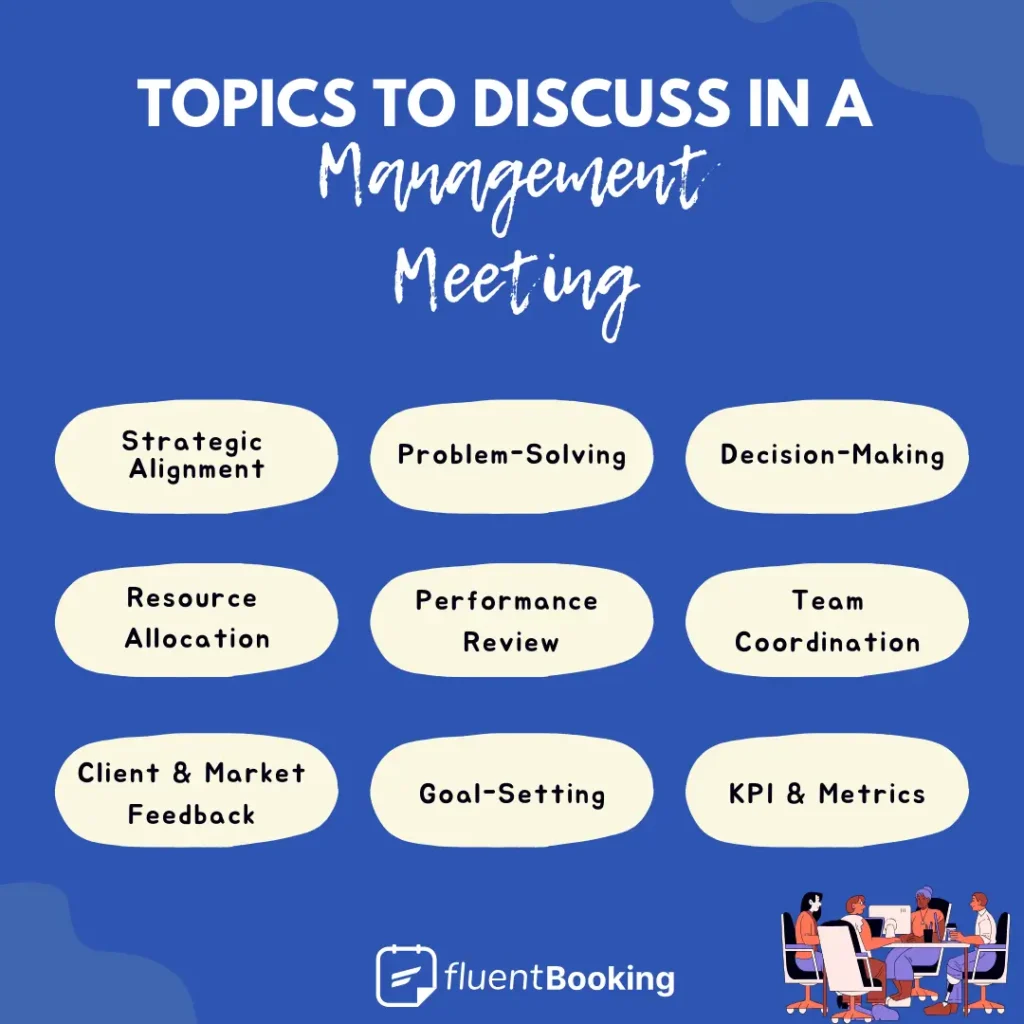
- Strategic Alignment: Ensure everyone is aligned with company goals and strategies, such as discussing how departments contribute to a new market entry
- Problem-Solving: Collaborate to address issues, like resolving delays in a product launch through brainstorming and deciding on solutions
- Decision-Making: Make key decisions, such as evaluating the pros and cons of investing in new technology and choosing the best option
- Resource Allocation: You can discuss resource allocation in management meetings to find the best way to distribute resources, like balancing the budget between marketing and development for a new product
- Performance Review: Assess the performance of different company areas, such as reviewing sales figures to see if targets are met and where adjustments are needed
- Client and Market Feedback: Look at market trends and customer feedback to update strategies, like making product changes based on customer input
- Goal Setting: Set and plan for future objectives, like new sales targets or project launches, and track progress toward these goals
- KPIs and Metrics: Review key performance indicators to gauge company performance, including revenue, customer satisfaction, and profit margins
Related: For more insights on meeting discussions, check out our article on key topics for team meetings.
Top 7 Best Practices to Build an Effective Management Meeting Structure
Successful companies know that alignment happens in meetings. So, ask yourself: “Are your meetings just updates, or are they driving progress?.”
Check out these best practices to make your meetings not just productive, but drive real progress:
Invite the Right People
When organizing a management meeting, invite only those who are essential, usually managers or leaders. In larger companies, fewer attendees can simplify decision-making.
To stay efficient, consider a monthly full meeting and weekly check-ins with key leaders. Tools like FluentBooking can simplify scheduling and ensure the right people are present, keeping meetings focused and productive.
Keep Meetings on Schedule
A common challenge in meetings is losing track of time, which can lead to inefficiency. To prevent this, assign someone to monitor the clock and keep discussions on track.
Since attention spans drop after about 30 minutes, keep meetings short and focused. Extend the meeting only when essential to fully cover critical topics.
Did you know? FluentBooking can automate scheduling and reminders, keeping everyone prepared and punctual. With everyone aligned, meetings stay focused, on time, and cover what matters most.
FluentBooking – The Ultimate WordPress Scheduling Solution

Schedule, Remind, & Focus!
Make your meetings run smoothly with less effort!
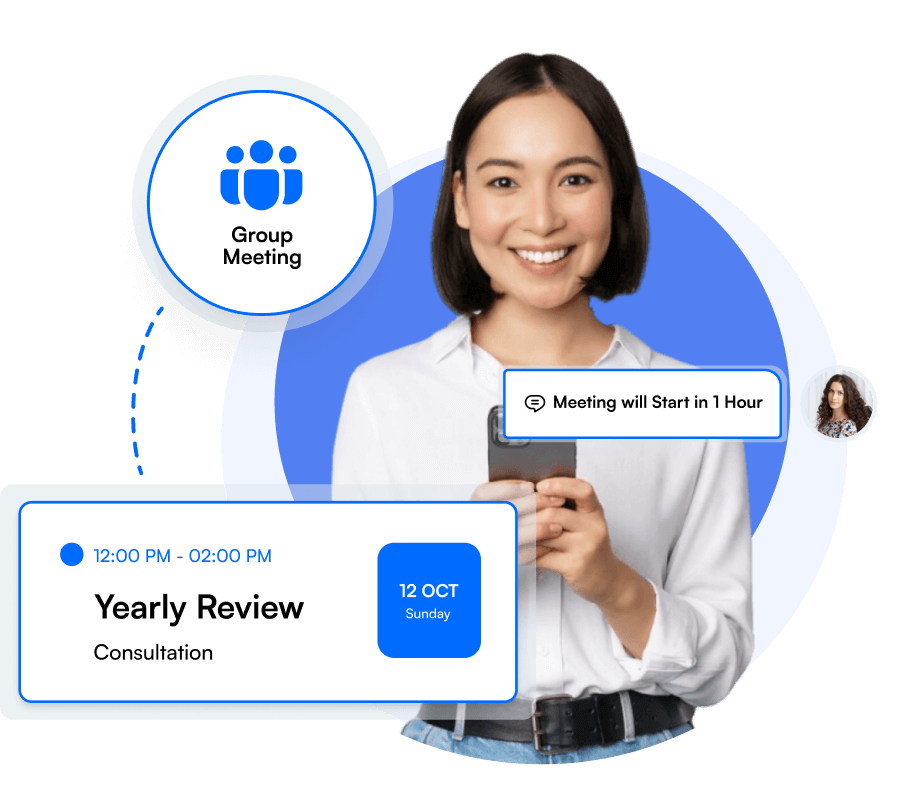
Prepare and Send Materials in Advance
Management meetings are usually packed with a lot of important topics, and it’s easy to get overwhelmed if you’re seeing everything for the first time during the meeting. To make the most out of these sessions, it’s a good idea to send out any important documents or reports ahead of time.
This way, everyone can come prepared and go straight into discussions without missing a beat. By reading these materials before the meeting, participants will be able to contribute more effectively and utilize the most out of the meeting time.
With appointment booking tools like FluentBooking, you can send a timely reminder with the meeting details to ensure attendance and preparation.
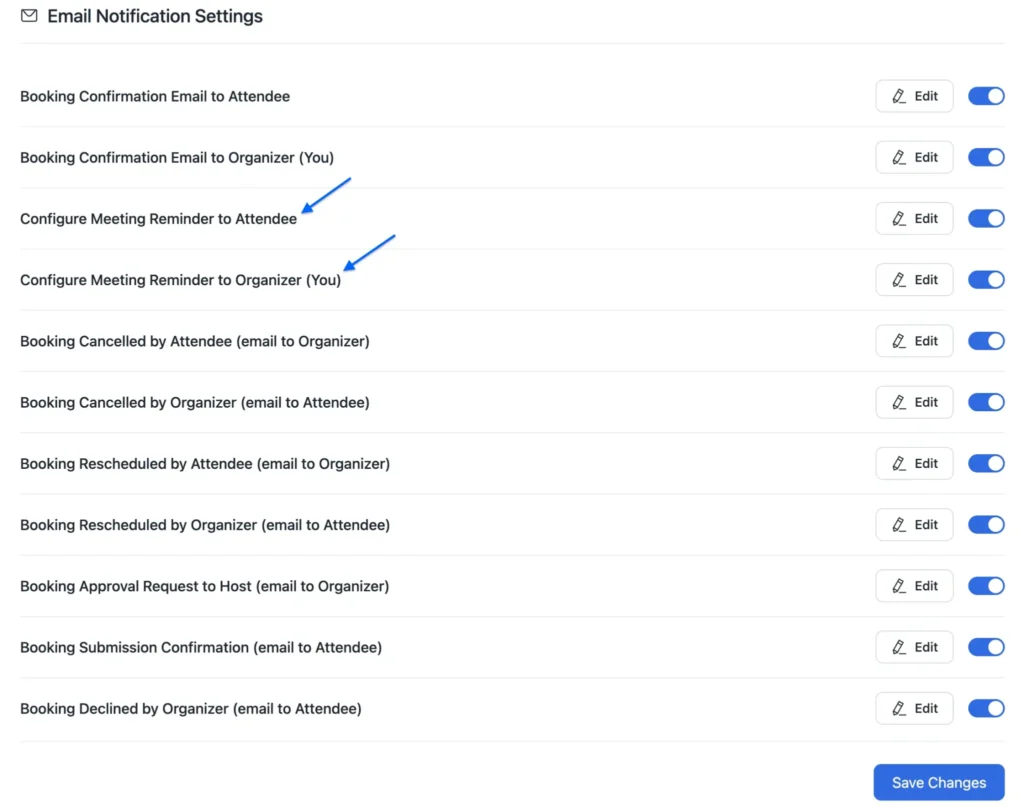
This way you can ensure full participation with automated email notifications.
Check out this guide on crafting amazing reminder emails!
Encourage Open Discussion
Management meetings are the perfect time to address and solve problems. Don’t avoid raising issues, even if they’re uncomfortable. For instance, if a project is behind schedule, discuss it openly rather than letting it escalate.
Encourage your team to list concerns on the agenda ahead of time. This way, everyone can come prepared, and those who are shy about speaking up won’t feel pressured, leading to a more inclusive and effective discussion.
Be Passionate and Inspire Creativity
In management meetings, your energy sets the tone. Show enthusiasm to encourage leaders to participate. Starting with positive energy helps everyone feel comfortable and ready to contribute.
It’s also important to encourage creativity. When leaders feel safe to share ideas, even outside their usual roles, it can lead to great solutions. Make sure everyone feels welcome to speak up.
Address Issues Early
These meetings are the perfect time for addressing problems early. If something’s wrong, speak up. As a manager, encourage your team to share concerns so issues can be resolved before they escalate.
Promote openness by actively listening and showing that you value transparency. This way, you can address issues early and prevent them from escalating into bigger problems.
Gather Feedback & Share Summary
Assign clear action items with deadlines and track them using a shared project management tool such as FluentBoards. Kick off the next meeting by revisiting these tasks, summarizing discussions, and gathering feedback to tackle any concerns.
Clearly outline the next steps and each leader’s role. Before closing, seek final feedback to resolve any remaining issues. Share a summary afterward to keep everyone aligned and accountable.
Embrace Management Meetings for Organizational Success!
Bringing together your top managers for management meetings is a great way to make the best out of their expertise, solve problems, and make key decisions.
These meetings are important but often don’t reach their full potential. Now that you’ve read this article, you can help plan meetings that are more effective, productive, and enjoyable for everyone involved.
To further enhance your management meetings, consider integrating tools like FluentBooking. It can simplify scheduling, manage reminders, and ensure the right people are there, freeing you up to focus on what really matters!
FAQs about Management Meeting
Have more questions? We’ve got the answers for you!
Maisha Abedin
Hey, it’s Maisha! I enjoy crafting stories and producing content that adds value to readers. Outside of work, you will either find me capturing the beauty in the mundane or daydreaming about the perfect lasagna!
Table of Content
Subscribe To Get
WordPress Guides, Tips, and Tutorials








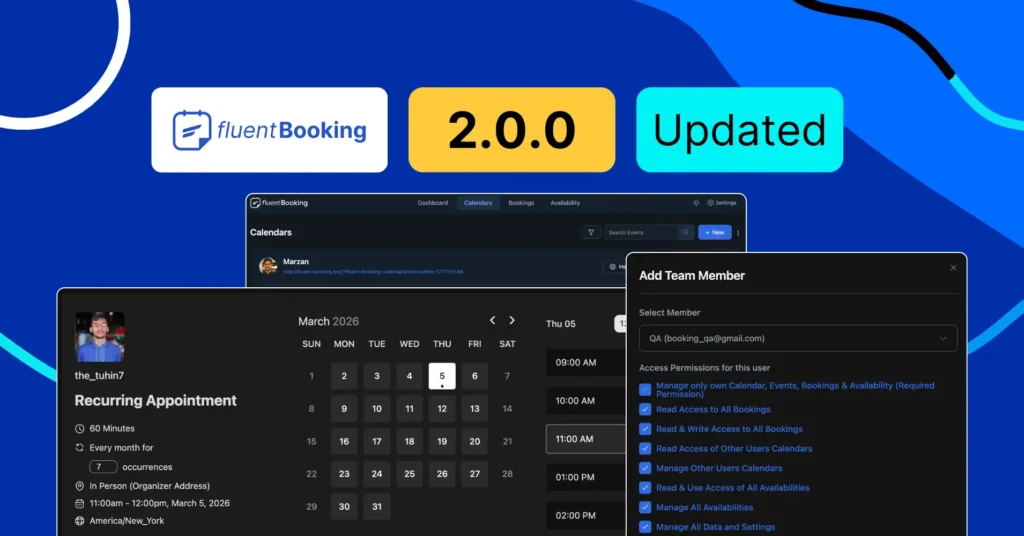


Leave a Reply